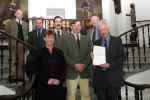|
A future for farming and crofting Sweeping proposals were published on 19th April 2004 which could help safeguard the future of farming and crofting communities in one of the most remote parts of Great Britain. The conclusions are contained in an extensive report commissioned by The Queen Elizabeth Castle of Mey Trust to examine the decline of farming and crofting in Caithness.
Ashe Windham, Chairman of The Queen Elizabeth Castle of Mey Trust, said: �The Queen Mother established the Trust for the benefit of the community and personally approved this initiative. We hope that the findings of this study will aid the people of Caithness, for whom Her Majesty had such a high regard. The Trustees hope that the proposals will help address the problems remote farming and crofting communities are experiencing and will go some way towards helping to keep these communities alive.� The research was designed to be a means of listening to the views of people living on farms and crofts in Caithness to gauge the current situation and to develop ideas which might better enable these families to survive and evolve in the future. This information was supplemented by interviews with staff from key agencies which included the Scottish Executive Rural Affairs Department (SERAD), the Crofters Commission, Scottish Agricultural College (SAC), Caithness and Sutherland Enterprise (CASE) and North Highland College.
�We heard complaints about the lack of co-operation between farmers and crofters and the failure to brand, promote and market Caithness produce, such as beef and archaeology, in the same way Orkney does.� He added: �There was concern over the
bureaucracy of grant and subsidy schemes, the number of such schemes and
lack of co-ordination and co-operation between them as well as the
frequent changes in them, and the attitudes of some Agency staff towards
crofters and farmers, or towards small schemes in general. Coutts & Co helped sponsor the report. Their chairman Lord Home said: "We were delighted to help fund this report, which is vital to understanding the issues faced by the farming and crofting communities in the region. �As a bank with large number of landowner clients, we are committed to supporting and understanding the many issues faced by farmers and crofters, in order to help ensure their survival in an ever changing agricultural world," he said. The study was also partly sponsored by The Arkleton Trust. Lady Higgs, Chairman of the Trust, said: �The Trust was set up to find new approaches to rural development and education, and we hope that this study, reflecting the voices of farming and crofting families, will help to assure a better future for Caithness.� Some of the findings and conclusions:
Background To The Report The fieldwork for the report was carried out between April 2002 and June 2003. Interviews were conducted � and the report largely written � before the announcement of agricultural policy changes following the mid-term review of the Common Agricultural Policy. The draft report of this study was prepared in July 2003 and discussed with The Queen Elizabeth Castle of Mey Trust President, HRH The Prince of Wales, Duke of Rothesay, and Trustees in August of the same year. The purpose of the report is to lay the groundwork for action. The Arkleton Institute for Rural Development Research at the University of Aberdeen was established by Professor John Bryden and Professor Mark Shucksmith in 1995. It is dedicated to inter-disciplinary research on rural development issues. The Centre is regarded as one of the leading research centres in its field in Europe. For further details visit: www.abdn.ac.uk/arkleton The Queen Elizabeth Castle of Mey Trust was established in 1996 for charitable purposes within the UK and particularly in Scotland. For further details visit: www.castleofmey.org.uk Funding for the report came from The Queen Elizabeth Castle of Mey Trust, The Arkleton Trust and Coutts & Co Bank. GIBSON WELCOMES REPORT'S FINDINGS |

